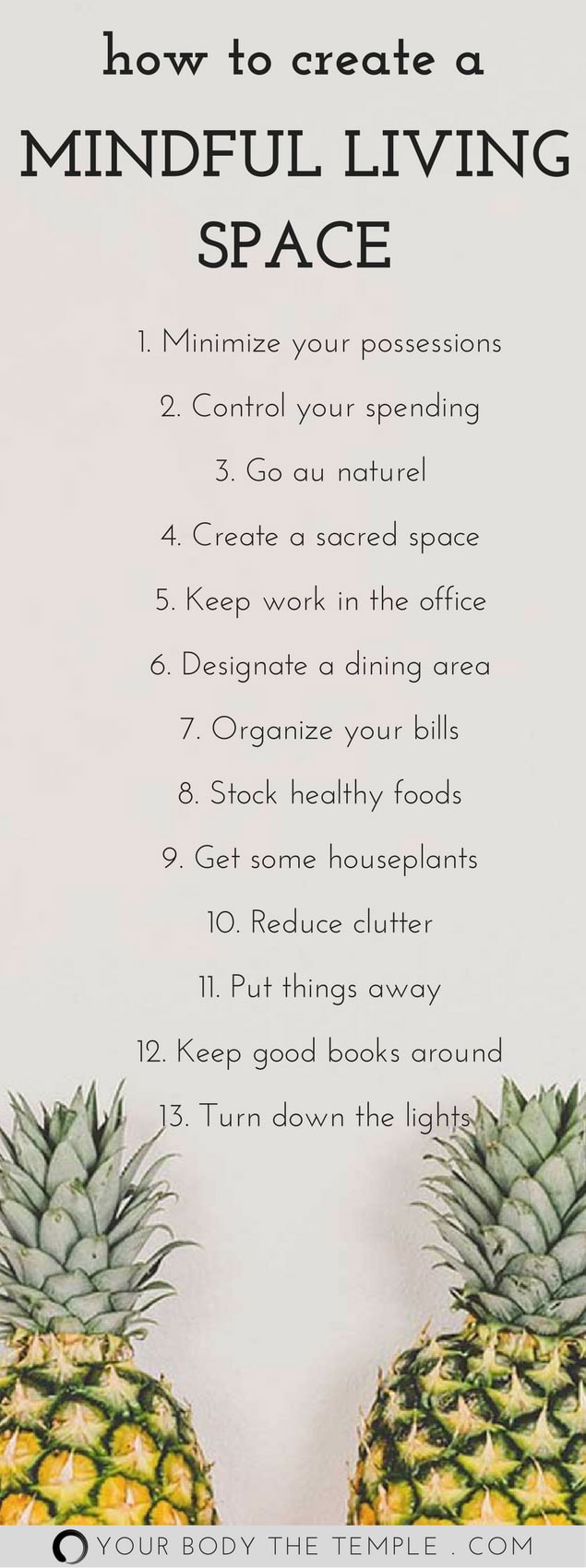Don’t you love walking into a house and immediately feeling peaceful?
From the moment you pass through the door, you know that this place just radiates bliss and tranquility…
And guess what? You can have that too.
It’s really not that hard to create a relaxing mindful space and it doesn’t require a huge decorating budget either. In fact, it’s actually quite easy and might even save you money!
Simple changes to your daily routine can have immense benefit for your health, happiness, and overall well-being.
We’ve put together a list of simple steps you can take to transform your living space into a more peaceful, calm, and relaxing environment.
Invite mindfulness into your daily routine by making these easy changes around your house and create a mindful living space you can really call home.
How to create a mindful living space
1. Minimize your possessions
Having a house full of “things” can negatively affect your health. Accumulating too much stuff can lead to increased stress, anxiety, and reduced sleep, not to mention financial burden. Donate, recycle, or give away any and all things you no longer use. Get rid of clothes that no longer fit, empty boxes of junk that have accumulated in the corner. Let go of any physical items that don’t promote peace and happiness.
2. Control your spending
Consumerism has become so deeply ingrained into Western culture. On average, you now see upwards of 5,000 advertisements per day as opposed from the 500 you would have seen back in the 1970s, for example. Learn to control your budget by being more mindful of how you spend money. Become aware of not just what but also why you buy. Start to notice any emotional triggers that encourage you to shop or want more stuff.
3. Go ‘au naturel’
Many of the products that we use to clean and scent our homes and workplaces are full of toxic chemicals. Empty your cabinets of chemical based cleaning agents. Shift your living space to a healthy environment by eliminating toxic products. Swap out air fresheners for essential oils and conventional cleaning agents for those with natural non-hazardous ingredients. This will go a long way to creating the ideal mindful living space.
4. Create a sacred space
Regardless of how big your home is, there is always enough room to create a sacred space. Find a room or a corner where you can commit to your mindful practice. Whether it’s yoga, meditation, or part of any religious or spiritual practice. Set up your mat, yoga seat, or meditation tools and commit yourself to keeping up with your mindful rituals. Dedicate this space to honoring your journey.
5. Keep work in the office
Almost 90% of people admitted that they waste time at work in a recent survey. Instead of browsing on the internet, your phone, or gossiping with people at the office, get your work done and leave on time. Break the habit of bringing work home with you, including checking work messages on your phone. When you’re in the office, use this time efficiently so you can maximize your productivity and leave on time and get to doing what you really enjoy at home!
6. Designate a dining area
Part of mindful practice is taking time to be present and savor each moment and meal time is no exception. Mindful eating has been linked to weight loss, healthier food choices, and increased culinary enjoyment. Instead of reading the news, watching TV or checking your phone, make eating part of your practice. Notice all the flavors, colors, textures and spices as you nourish your body. Eat slowly, peacefully without distraction. Create a dining area where cell phones, tablets, and other distractions aren’t permitted.
7. Organize your bills
We all have bills, but none of us wants to be reminded of them all the time. If you are in the habit of leaving bills out on the table or counter, it’s time to make a simple yet profound change. Start a simple filing system just for bills. Manage your expenses in a responsible manner and then once they’ve been looked after, file them away. If you’re perpetually stressing over money, it’s not going to make you feel great constantly looking at receipts and invoices. Bring order to your inbox, to your mailbox, and to your mind by mindfully managing your piggybank.
8. Stock healthy foods
Part of mindful practice is developing a positive relationship with food. Start to fill your fridge and cupboards with healthy food options. Eliminate processed, fatty, and sugary foods to fuel your body with delicious nutrient packed foods. Pack healthy snacks with you for your workday and start flirting with healthier food options.
9. Get some houseplants
No mindful living space is complete without plants. Whether outside in nature or indoors in your home or office promote better health and happiness. Get some houseplants for your work and your home. If you have no green thumb talent, treat yourself to some cut flowers. Add some color, brighten your day, and add a little dash of natural beauty.
10. Reduce clutter
Your living space should be neat, tidy, and free from distracting clutter. If you make a habit of collecting random things like restaurant mints, pens, grocery bills, it’s time to let them go. The less clutter you have in your physical environment the less clutter you will have in your mind. By minimizing your possessions, organizing your living space and practicing mindful consumption, you will save money while creating a more peaceful environment.
11. Put things away
Get in the habit of keeping your living space tidy. Put things back to their designated place as soon as you are done with them and your home will always be tidy. Empty out those drawers of random junk in your home. Clear out the boxes of memorabilia that are stacked in the closet accumulating dust, the drawers with old tags, pens, or any unused items. This will save you time, frustration and will make you more comfortable in your own place.
12. Keep good books around
Instead of always reaching for your phone, get in the habit of picking up a good book. Whether it’s a coffee table show piece, a collection of short stories, or a book of quotes, choose whatever inspires you. If you’re hosting company or have guests visiting, having books around stimulates conversation and you’ll be pleasantly surprised how often people gravitate to a nice book on the table.
13. Turns the light down
Artificial lights have been linked to many negative health effects including breast cancer, sleep disorders, and metabolism disruption. Even dim light emitted from your computer screen, tablet, and cellphone in the evening can dramatically interfere with your sleep patterns. Set a bedtime routine that involves turning down the lights and putting your phone and electronic gadgets away at least an hour before you want to go to sleep. Spark out some candles, dim your lights, and practice settling down into a calming evening routine.
Take away
Simple steps can help you create a relaxing, calm, and mindful living space.
Regardless of the size of your living quarters or your budget, these small changes can have a dramatic impact on how you feel.
Reducing your need for stuff, staying organized, and going green are just a few examples of lifestyle changes that can help you cultivate a more mindful, tranquil, and inviting home.


